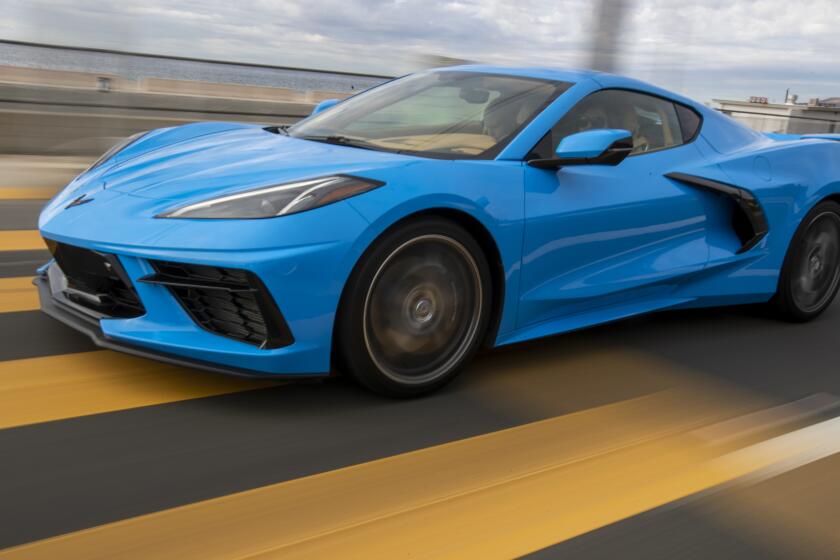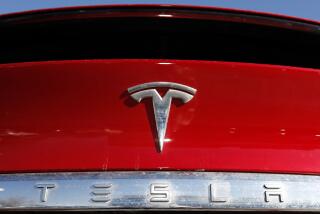2020 Genesis G90 review: A worthy luxury sedan at a reasonable price
My driveway recently: A chic, full-size, four-door sedan beckons, its stance confident, its massive tires festooned with intricate, multifaceted wheels. Elegant and expensive, just by the look of it. I open the driver’s door, hefty in the way that speaks to craftsmanship. On the ground at my feet, a beam of light casts the maker’s logo on the pavement. I slide inside the cocoa-colored, quilted leather cockpit and look around with delight at the expansive touchscreen, the beautiful knobs and switches, and intuitive systems and interfaces. It’s already memorably different, and I haven’t even started the engine yet.
What is it — BMW 7 Series? Mercedes S-Class? Audi A8? Lexus LS?
Nope. It’s the 2020 Genesis G90, the latest flagship from Hyundai’s newish (established in 2015) luxury arm. It’s pretty hard to launch a brand these days, let alone achieve actual luxury. Spoiler alert: Genesis seems to be doing just that.
Thank you, Chevy, for setting a new high-water mark for an irresistible, ultra-high-performance car that is also financially approachable as well as user-friendly.
For example, in the last two years, Genesis has scored more than two dozen awards from the likes of Consumer Reports, J.D. Power, Motor Trend and Cars.com. That’s tough enough for the European dominators, let alone an upstart with only three sedans. (Genesis’ first SUV, the visually promising GV80, will debut later this year, and the company says its first full electric vehicle will hit the market in 2021.)
Another, more under-the-radar sign of success: Genesis has hired several world-class car designers. That list is topped by Luc Donckerwolke, former design exec at Volkswagen Group, as well as Bentley’s SangYup Lee. (Ex-Bugatti designer Sasha Selipanov also spent a moment at Genesis and whipped up the clever Genesis Mint EV concept before moving on to Swedish super-car maker Koenigsegg.)
Genesis is muscling its way to a new definition of greatness.
Think back to the 1980s when Honda launched Acura, Toyota birthed Lexus and Nissan created Infiniti. Those companies audaciously set out to steal market share from the mostly German incumbents — Mercedes, BMW, Audi. Which meant they had to offer more content at a slightly lower price and hope U.S. consumers would bite.
They did, although of the three, only Lexus has achieved a real seat at the table in terms of sales. And those brands, brave as they were at the time, didn’t have to compete with the likes of Tesla, Porsche, Land Rover and so on. And then there’s the powertrain angle; other big brands have EVs, hybrids, even hydrogen offerings. Today, for instance, BMW offers 17 model lines, with nearly countless variants. Genesis has three.
Genesis isn’t the only one trying to reinvent luxury. Many have tried and continue to fail: Cadillac, Maserati and Lincoln are just a few. Why? Because it’s really hard to steal attention from such formidable competition. And it’s really expensive to actually make the leap from near-luxury to true luxury.
One of the few exceptions that has bravely broken the mold is Volvo. If you haven’t sat in a new Volvo lately, you have a treat awaiting you. From natural wood accents and an ear-blowing Bowers & Wilkins sound system (which you can set to mimic the acoustics of the Gothenburg Opera House) to impressive ride quality, Volvos today stand up to Germany’s best. Sad for the Swedes, though, and good for you: You get way more content for your dollar, while Volvo spends lots of marketing dollars to get consumers to even consider purchasing one.
That’s exactly where Genesis stands too — cars rich on details and sophisticated systems and discounted on price. The G90 is the poster child of this — an enviable interpretation of what a grande dame of sedans should be at a base price of $72,200. That’s below the Lexus LS, Audi A8, Mercedes S-Class and BMW 7 Series.
Genesis has another hurdle: dealer network. There are 350 Genesis dealers in the U.S. versus 800 Hyundai/Kia stores. I don’t know about you but I derive no joy from visiting a dealership, any dealership, let alone one that might be a good 40-minute drive away. One solution: Genesis has committed to offering every buyer 100% concierge service, from a $37,000 G70 up to the G90. For three years or 36,000 miles, a Genesis rep will bring a loaner vehicle to you, pick up your Genesis for service, and return it to you when it’s done.
Many other brands have experimented with similar programs, but none has stuck by it. I think it’s genius. Suddenly the dealership’s distance just doesn’t matter.
So, back to the G90 in my driveway.
I start the engine and hear the powerful purr of its naturally aspirated V8 (the only one in the category). I set off, secure in its poshness. Immediately, I can feel that it’s fast — really fast for such a big car, effortlessly helping me to taunt my speeding-ticket fate. And it’s smooth, elegantly buffering me from speed bumps and the grit and grime of the real world just outside its soundproof windows.
Last summer, Genesis lent me the older version, the 2019 G90, to drive home from Pebble Beach car week. That car, even without wireless phone charging, Apple CarPlay and the bells and whistles the 2020 version has, was delightful. I arrived home after a five-hour-plus drive relaxed and refreshed. The next day, a Maserati Ghibli, fully loaded, was delivered to me for testing. I got out of the G90 and into a car nearly double in price — and was crestfallen at how inferior it was.
You may not be in the market for a big sedan — or a smaller one, for that matter — but take my advice and pay attention to Genesis. It’s on a tear and doing all the right things. The world — meaning residual value and brand recognition — hasn’t caught up yet, but it will. In the meantime, appreciate the value of a tremendous sleeper and the crazy-big investment Hyundai is making to win long term.
2020 Genesis G90
Price: $72,200
Mileage: 17 city / 25 highway
Engine: 3.3-liter V-6, 5.0-liter V-8
0 to 60: 5.4 seconds
More to Read
Sign up for The Wild
We’ll help you find the best places to hike, bike and run, as well as the perfect silent spots for meditation and yoga.
You may occasionally receive promotional content from the Los Angeles Times.











